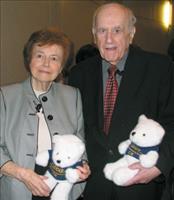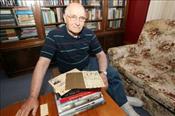One hundred and fifty Czech teens, selected by the Jewish Agency’s Youth Aliyah and the Denmark branch of the Women’s International League for Peace and Freedom, were taken, in October 1939, to Denmark, then scattered across the countryside in foster homes. One hundred and fifty Jewish teens were sent to work on farms; they were cared for, they were loved, but they were also, understandably, desperately afraid for those they left behind.
Davis’ composition, “The Last Train to Tomorrow,” a piece for orchestra, children’s choir and young actors, tells the story of Kindertransport children from Germany, Austria and Czechoslovakia. The composition recently premiered in England, and if Boca Raton resident Brenda Wertheim has her way, South Floridians will also get a chance to hear it.

Dr. Michael Berenbaum speaks about a variety of Jewish issues from the past as well as in today’s world on Sunday. Dr. Berenbaum was the closing keynote speaker at The Kindertransport Association 2012
When George Fogelson speaks to schools about his mother’s experience during the Holocaust, he brings a relative’s passport stamped with a “J” for Jew. And he passes around a yellow star Jewish people were forced to wear by the Nazis. It helps children better grasp what happened. And it’s a tool the Redondo Beach resident uses to pass on the story of his mother, one of about 10,000 children spared from Hitler’s armies when her parents sent her away to strangers, on a Kindertransport.
Ellen Fletcher, a former Palo Alto City Councilwoman who spearheaded the city’s transformation into a nationally recognized bike-friendly community, died Wednesday, Nov. 7, after a battle with lung cancer, according to her friends and family. She was 83.

IT entrepreneur Dame Stephanie Shirley, 79, founded Xansa, a global software company that brought her wealth of £150m, much of which she has given away. Shirley arrived in England in 1939 at the age of five as an unaccompanied Kindertransport refugee. Adopted by a middle-aged couple, she grew up in the Midlands and on the Welsh border. At 18 she joined the Scientific Civil Service for eight years, and studied for a mathematics degree at night school. Financial Times

Ruth Moos, 90, of Laguna Woods was 13 when she fled Nazi-controlled Germany in the kindertransport effort.
The day in 1936 when 13-year-old Ruth Moos fled Nazi-controlled Germany, her parents stood on the train departure platform in Berlin, crying. But she didn’t dare look at them or wave goodbye. The pain would have been unbearable. Instead, the teenage girl steadfastly read a novel she’d brought for her journey across the Atlantic. “I had to shut off my emotions completely,” said the Laguna Woods resident, who is now 89.
Queensborough’s Harriet and Kenneth Kupferberg Holocaust Resource Center and Archives is hosting Kindertransport: a Unique Rescue Operation. It is an exhibit of photographs and first-hand accounts, vividly conveying the rescue mission. Running July 12 – September 30, the exhibit opened with a ceremony to recognize the humanitarian role played by Great Britain in the Kindertransport. British Consul-General Danny Lopez accepted the Kupferberg Holocaust Center’s Freedom Award.
LONDON — “I wouldn’t be here today if not for the generosity of strangers,” said Michael Moritz, while announcing a major donation to Oxford University. In an interview afterward, Mr. Moritz said that his father, Alfred, had grown up in Munich, where his father was a judge who lost his post when the Nazis came to power. Mr. Moritz’s mother, Doris, was part of the Kindertransport,

Cheers! Dr. Ruth Westheimer will celebrate her 84th birthday next week — and her new wine line, which will be sold in grocery stores and bodegas. (Photo by Tamara Beckwith)
“I was an orphan at the age of 10, Hitler didn’t want me to be alive. Today, when I see my grandchildren, I say: ‘I won and not Hitler.’ I’m alive when 1.5 million Jewish children were killed, and I have an obligation to make a dent in this world. When I was younger, I didn’t know I was going to be a sex therapist, but that dent was me writing and talking about sex.” Dr. Ruth’s Vin d’Amour will be sold for $7.99-$9.99, with a portion of the profits going to the Museum of Jewish Heritage.

Mona Gollabek’s one-woman show ‘The Pianist of Willesden Lane’ is now at the Geffen Playhouse. (Kirk McKoy / Los Angeles Times / May 25, 2012)
L.A. concert pianist and radio show host Mona Golabek makes her theatrical debut at the Geffen Playhouse in “The Pianist of Willesden Lane,” a one-woman show of music and words based on “The Children of Willesden Lane,” the book she co-wrote about her concert pianist mother’s journey from 1938 Vienna to England on the storied Kindertransport. The show runs through June 24.

Kurt and Margaret Goldberger hold teddy bears they received after speaking at the College of Saint Elizabeth.
More than 500 public and Catholic parochial school students, accompanied by their teachers, sat in rapt attention at the College of Saint Elizabeth on May 1 as two Jewish Holocaust survivors, Kurt and Margaret Goldberger, described being shipped away from their homes and parents during World War II.
THE whole Swansea audience found Kindertransport — a play about the Holocaust — emotional to watch, but no one more so than Ellen Davis — because she was actually there. Mrs Davis arrived in Swansea in 1939 as one of 10,000 Jewish children sent abroad to escape Nazi atrocities. The rest of her family, including her brother and sisters, were sent to Latvia where they were shot and killed.
Mona Golabek’s one woman homage to her mother, Lisa Jura is a superlative show. Golabek, a world renowned concert pianist, gives us a dramatic and heart rending performance as both a pianist and as an actress. Hershey Felder adapted the play from the book by Golabek and Lee Cohen, The Children of Willesden Lane. “This Pianist of Willesden Lane” is at the Geffen Playhouse through June 24th. For info call 310-208-5454 or check www.geffenplayhouse.com .
From Illinois Public Media: Video testimony of Champaign resident, Heini Halberstam. Heini Halberstam was born in Czechoslovakia, and separated from his mother during the Nazi occupation. He believes she died in a labor camp. Halberstam said that changed his life forever. To listen to the full interview
Aged only seven, as she was ushered from her classroom in Vienna, evidence of Kristallnacht was everywhere. “We were all herded out of the school when there was the smell of burning, taken to a hall and taken home the next morning,” she said. “I remember seeing some old women scrubbing the pavement with toothbrushes with either the SS or the SA standing over them. “It just happened – you don’t analyse things at that age.”
There are many stories about good people and organizations risking their lives to help Jewish families survive the atrocities of Nazism. Here is one of those stories. In the months between the Kristallnacht Pogrom of November 9-10, 1938, and the start of World War II, nearly 10,000 children were sent out of Nazi Germany, Austria, Poland, and Czechoslovakia to safety in Great Britain. Their parents remained behind.

Holocaust survivor Guenther Goldsmith talks to Missouri University students about his experience fleeing Nazi Germany via the Kindertransport, in Ellis Library on the MU campus.
I was put on a train with 10 other children in Berlin to Spain and then got on a boat and four weeks later arrived in New York, Goldsmith said. “The next day I was on my way to St. Louis.” More typically, Kindertransports were sent to England. A few Jewish children were sent to the United States because their families had made arrangements for them to live with families there. Goldsmith arrived in St. Louis in 1941, at the age of 15. He moved in with an uncle and began high school.
Malka and Abraham Jura faced a Solomonic decision in late 1938, as the Nazis were tightening the vise on the Jews of Vienna. The couple hoped to send their three daughters to safety but were able to wrangle only one place on the Kindertransport ferrying a limited number of Jewish children to London. After much agonizing, the Juras decided to give the spot to 14-year-old Lisa, a remarkable piano prodigy.

John Schnellenberg with his parents’ passports. Mr Schnellenberg was three when he arrived in New Zealand in 1939.
Suitcases belonging to two Jewish children sent by their parents from Nazi Germany to England, and eventually to Masterton, will be unveiled at the Holocaust Centre of New Zealand. The two children “escaped the horrors of the camps” via Kindertransport, sent by their parents to England and eventually settled with relatives in Masterton in 1946. They never saw their parents again.
t was more than 50 years after the Kindertransport that Margaret first heard the term for the movement that saved her mother. Today, she has an even better understanding of her mother’s past and an appreciation for her resiliency. “My mother said, ‘We always looked forward, never back, we needed to find hope for the future.’ It was hope that kept them moving forward, even when they came to Canada as immigrants and tried to get ahead.”